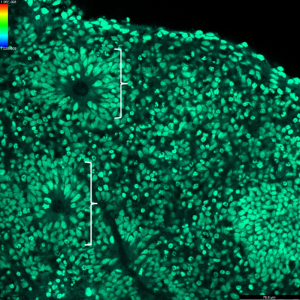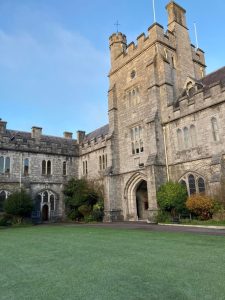16 May 2023

Neurodevelopmental disorders (NDDs) represent a growing challenge in modern medicine and may give rise to impaired cognition, communication, and psychomotor skills. It is therefore very important that more sophisticated in vitro models are created to reveal the complexities of these disorders.
Nore Van Loon, a PhD student from the University of Ghent, used a Travelling Fellowship from Disease Models & Mechanisms to visit Michael Vaughan’s lab at University College Cork. Nore intends to start an interdisciplinary project focused on human organoid engineering and found the visit to Ireland particularly useful, because Michael specialises in cerebral organoids and has previously optimised a protocol for their generation.
 On the day of Nore’s arrival in Ireland, Sunday 4 December 2022, Michael gave a guided tour of the lab, the university, and the city of Cork. The next day, the pair planned for the coming two weeks and Nore got to grips with the details of Michael’s organoid generation protocol and the required materials.
On the day of Nore’s arrival in Ireland, Sunday 4 December 2022, Michael gave a guided tour of the lab, the university, and the city of Cork. The next day, the pair planned for the coming two weeks and Nore got to grips with the details of Michael’s organoid generation protocol and the required materials.
Nore benefitted from practical, hands-on experience whilst completing organoid generation, a process spanning ten days. She briefly recalled the experience whilst speaking to The Company of Biologists:
“Michael would start the generation of a first batch of organoids on Tuesday so that I could observe the process before trying it myself, generating a second batch of organoids under Michael’s supervision. The first step of organoid generation (Day 0) involved the formation of embryoid bodies out of induced pluripotent stem cells (iPSCs)” she said.
In total, it takes 45 days to produce mature organoids using this protocol, so Michael had also prepared some mature organoids in advance of Nore’s visit. This allowed for efficient time management during Nore’s visit of two weeks, giving her the chance to learn the important handling steps in the first 10 days of organoid generation, as well as the handling of mature organoids.
“This hands-on training, made possible by Disease Models & Mechanisms, was the ideal start-off for me towards a successful PhD” – Nore Van Loon, Travelling Fellowship recipient.
During her time in the lab, Nore also learnt the process of live staining mature organoids with different dyes, alongside both PFA and SHIELD fixation of stained and unstained organoids. In addition, Nore prepared fibrous micro scaffolds from suture vicryl, which can be used to generate elongated embryoid bodies that more reproducibly generate human forebrain tissue.
With the experience gained during this Travelling Fellowship, Nore is looking forward to efficiently conducting her own organoid studies back at the University of Ghent.








You must be logged in to post a comment.